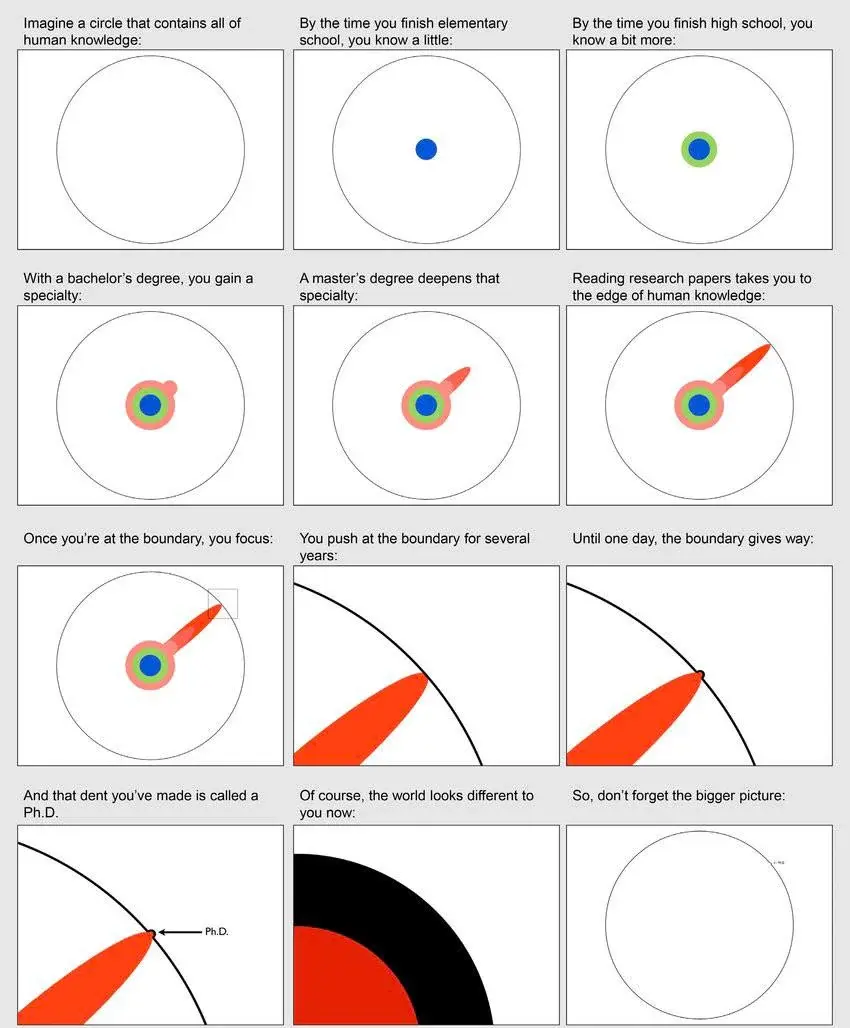this post was submitted on 18 Nov 2023
1070 points (96.8% liked)
Science Memes
16153 readers
2065 users here now
Welcome to c/science_memes @ Mander.xyz!
A place for majestic STEMLORD peacocking, as well as memes about the realities of working in a lab.

Rules
- Don't throw mud. Behave like an intellectual and remember the human.
- Keep it rooted (on topic).
- No spam.
- Infographics welcome, get schooled.
This is a science community. We use the Dawkins definition of meme.
Research Committee
Other Mander Communities
Science and Research
Biology and Life Sciences
- !abiogenesis@mander.xyz
- !animal-behavior@mander.xyz
- !anthropology@mander.xyz
- !arachnology@mander.xyz
- !balconygardening@slrpnk.net
- !biodiversity@mander.xyz
- !biology@mander.xyz
- !biophysics@mander.xyz
- !botany@mander.xyz
- !ecology@mander.xyz
- !entomology@mander.xyz
- !fermentation@mander.xyz
- !herpetology@mander.xyz
- !houseplants@mander.xyz
- !medicine@mander.xyz
- !microscopy@mander.xyz
- !mycology@mander.xyz
- !nudibranchs@mander.xyz
- !nutrition@mander.xyz
- !palaeoecology@mander.xyz
- !palaeontology@mander.xyz
- !photosynthesis@mander.xyz
- !plantid@mander.xyz
- !plants@mander.xyz
- !reptiles and amphibians@mander.xyz
Physical Sciences
- !astronomy@mander.xyz
- !chemistry@mander.xyz
- !earthscience@mander.xyz
- !geography@mander.xyz
- !geospatial@mander.xyz
- !nuclear@mander.xyz
- !physics@mander.xyz
- !quantum-computing@mander.xyz
- !spectroscopy@mander.xyz
Humanities and Social Sciences
Practical and Applied Sciences
- !exercise-and sports-science@mander.xyz
- !gardening@mander.xyz
- !self sufficiency@mander.xyz
- !soilscience@slrpnk.net
- !terrariums@mander.xyz
- !timelapse@mander.xyz
Memes
Miscellaneous
founded 2 years ago
MODERATORS
you are viewing a single comment's thread
view the rest of the comments
view the rest of the comments

Wait, how bad are bachelors' degrees in the US/anglosphere? I was contirbuting to research projects and had a specialization by the time I was done with my five year bachelors' equivalent.
In fairness, I think the system has since been reformatted so that the fifth year is now a (paid for) master's, but still. That graph makes it seem like it's high school with benefits.
College is what you put into it. A lot of people don't get into the networking side of it because it's never really introduced to them. Mostly professors look for those who are "turned on" to bring onto projects like that, that is, those that are engaged and asking questions and curious.
Youngins, lpt: talk to your professors and let them know you are interested and ask questions. It's what you are there for- access to brains.
Well, not really over here. You do have to do a bunch of hands-on stuff for credits. Can't even replace those with more standard subjects.
You can absolutely wing it past all five years, depending on your degree, but between mandatory projects and internships you have to try really hard to not get some level of expertise in the field.
Plus, university curriculums have specializations here, so you get mandatory courses on pretty narrow subjects whether you like it or not. So... I guess there are some differences, maybe? I was pissed when they announced they'd do that masters' thing here because the price of tuition for that year goes from being a couple hundred to a few thousand for basically the same curriculum, but this is definitely not the first time I notice that the anglosphere assumes there's a huge difference between the two things.
The UK system is a bit better about those kinds of things, courses tend to be modular with required internships etc. The American system is a lot different and scheduled like high school, but that may have changed since I was in it. It really was dependent on the course, though. I like the UK setup much better.
You can do a bachelor's in college? Not here. College is typically only two year programs.
College and university are relatively interchangable colloquially in American English. Associate's Degrees are 2 years. Colleges in Europe etc. are different.
In Germany (and Europe, I believe, since the Bologna reforms), a bachelor’s is (usually) 3 years and a master’s is 5 years. That might be why you got to do research and I didn’t. How long are your master’s courses?
One year, typically. Some could be two or have a big chunk of on-the-job training/internship.
We used to have a more prominent 3 year degree, but it went semi-extinct in favor of other intermediate education, leaving our Bachelor's equivalent being 4-5 years, depending on which degree you're going for. And yeah, I think now they made them all 4 year and have more of a master's offering.
The thing is that internationally those 4-5 year degrees are still the thing immediately under a masters' degree, so there is a bit of a mismatch there. That goes some ways towards clarifying that, thanks.
It depends on the course. For my course, the bachelor's year included a project that was more design based, while the master's year had a project that was research based, however I ended up working with a PhD student assisting in his research project for my bachelor's.
It definitely sounds that our system was a bit more standardized than that, which checks out and is both a strenght and a weakness depending on how you look at it.